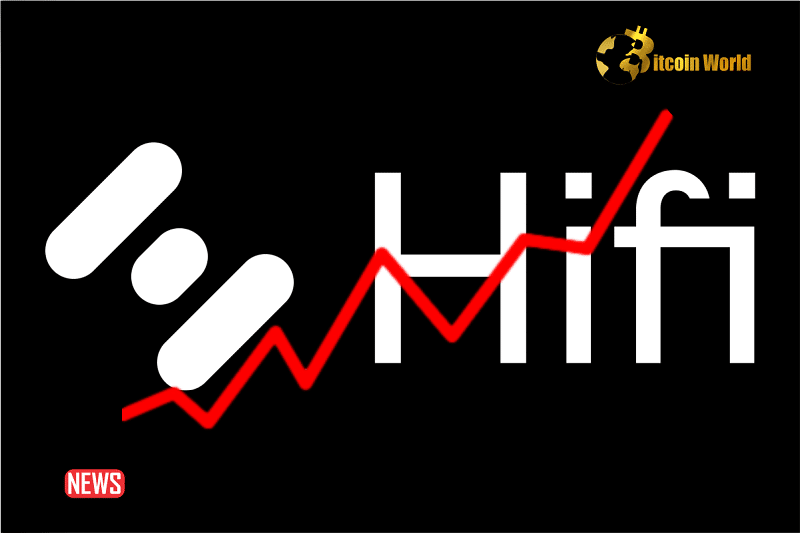In the wild world of crypto, sudden price explosions can leave you scratching your head. Recently, HiFi Finance (HIFI), a decentralized lending protocol built on Ethereum, experienced a staggering 100% price increase in just 72 hours. What’s behind this surge? Let’s dive into the details and uncover the factors driving HIFI’s unexpected rally.
What is HiFi Finance (HIFI)?
HiFi Finance is a decentralized lending system operating on the Ethereum blockchain. It facilitates lending and borrowing using decentralized interest rate marketplaces with specified maturity dates. Unlike traditional lending platforms, HiFi utilizes an Automated Market Maker (AMM) model. Users contribute tokens to liquidity pools, and an algorithm dynamically adjusts interest rates based on supply and demand.
Here’s a breakdown of how it works:
- Liquidity Pools: Users deposit tokens into pools, providing the capital for lending.
- Dynamic Interest Rates: An algorithm adjusts rates based on supply and demand within the pools.
- Fixed-Term Lending: Loans have specific maturity dates, providing clarity for both borrowers and lenders.
Users can participate by supplying liquidity, borrowing, or lending. Borrowers benefit from a fixed interest rate, simplifying the process compared to negotiating terms individually.
HIFI Tokenomics: Understanding the Fundamentals
The HIFI token is central to the HiFi Finance ecosystem. It plays a vital role in governance and offers various benefits to holders. To understand the price surge, let’s examine its tokenomics:
- Total Supply: Limited to 126.25 million tokens.
- Distribution:
- MFT Holders: 100 million HIFI (79.2%)
- Hifi Labs: 25 million HIFI (19.8%)
- Airdrop: 1.25 million HIFI (1%)
- Circulating Supply: Approximately 95 million HIFI (as per recent data).
Decoding the Price Surge: What Drove the 100% Increase?
Several factors contributed to HIFI’s impressive price jump. Let’s explore the key drivers:
Market Trends and Trading Volume
According to data from Lookonchain, a significant portion (around 70.39%) of HIFI’s trading activity occurs on the Korean exchange Upbit. The price on Upbit is also approximately 1.2% higher than on Binance, demonstrating the influence of regional exchanges on HIFI’s value.
Concentration of Token Ownership
The top 20 holders control a substantial 95.76% of the total HIFI supply, equivalent to $138 million. Further analysis reveals that exchanges hold a large fraction of the total supply, with Upbit alone holding 54.23%.
Key Factors Summarized
Here’s a summary of the primary factors contributing to the price surge:
- High Trading Volume on Upbit: Significant trading activity on a single exchange can drive up demand and price.
- Price Discrepancies Between Exchanges: Differences in price across exchanges can create arbitrage opportunities and influence overall value.
- Concentrated Token Ownership: A large portion of tokens held by a few entities can lead to increased volatility and price manipulation.
Read Also: 3 Reasons Why XRP Price Is Showing Declining Performance
Navigating the Crypto Landscape: Key Takeaways for Investors
The HIFI price surge highlights the importance of understanding tokenomics and market dynamics. As the cryptocurrency market evolves, investors need to:
- Research Tokenomics: Understand the supply, distribution, and utility of a token.
- Monitor Trading Activity: Track trading volumes and price movements across different exchanges.
- Assess Token Ownership: Identify the concentration of token ownership and potential risks.
Conclusion: Staying Informed in the Crypto World
The rapid price increase of HiFi Finance (HIFI) serves as a reminder of the volatility and complexity of the cryptocurrency market. By understanding the underlying factors driving these movements, investors can make more informed decisions and navigate the crypto landscape with greater confidence. Always conduct thorough research and consider consulting with a financial advisor before making any investment decisions.
Disclaimer: The information provided is not trading advice. Bitcoinworld.co.in holds no liability for any investments made based on the information provided on this page. We strongly recommend independent research and/or consultation with a qualified professional before making any investment decisions.
Disclaimer: The information provided is not trading advice, Bitcoinworld.co.in holds no liability for any investments made based on the information provided on this page. We strongly recommend independent research and/or consultation with a qualified professional before making any investment decisions.




